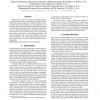Free Online Productivity Tools
i2Speak
i2Symbol
i2OCR
iTex2Img
iWeb2Print
iWeb2Shot
i2Type
iPdf2Split
iPdf2Merge
i2Bopomofo
i2Arabic
i2Style
i2Image
i2PDF
iLatex2Rtf
Sci2ools
112
click to vote
INTERSPEECH
2010
2010
Domain adaptation and compensation for emotion detection
Inspired by the recent improvements in domain adaptation and session variability compensation techniques used for speech and speaker processing, we study their effect for emotion prediction. More specifically, we investigated the use of publicly available out-of-domain data with emotion annotations for improving the performance of the in-domain model trained using 911 emergency-hotline calls. Following the emotion detection literature, we use prosodic (pitch, energy, and speaking rate) features as the inputs to a discriminative classifier. We performed segment-level n-fold cross validation emotion prediction experiments. Our results indicate significant improvement of performance for emotion prediction exploiting out-ofdomain data.
Emotion Detection Literature | Emotion Prediction | INTERSPEECH 2010 | Session Variability Compensation | Signal Processing |
| Added | 18 May 2011 |
| Updated | 18 May 2011 |
| Type | Journal |
| Year | 2010 |
| Where | INTERSPEECH |
| Authors | Michelle Hewlett Sanchez, Gökhan Tür, Luciana Ferrer, Dilek Hakkani-Tür |
Comments (0)

